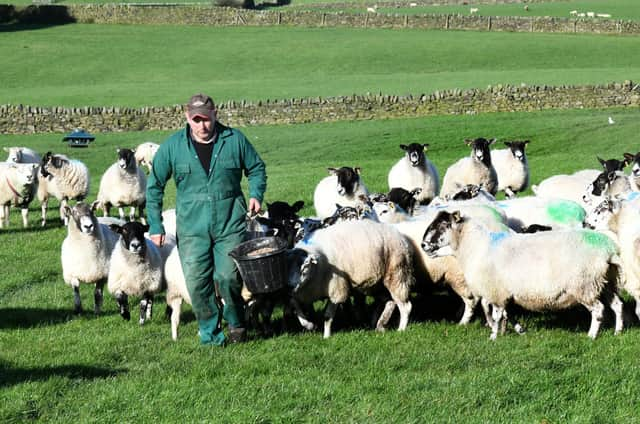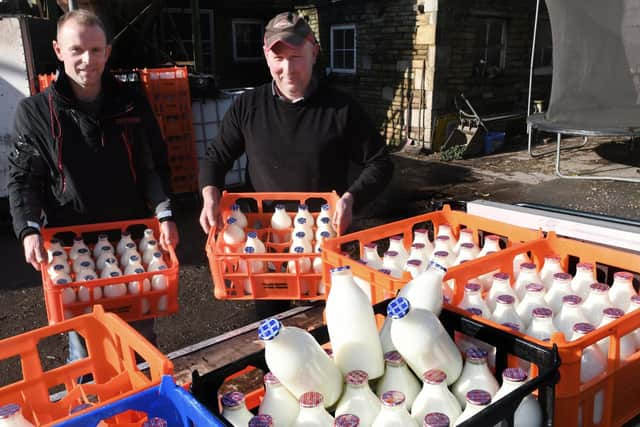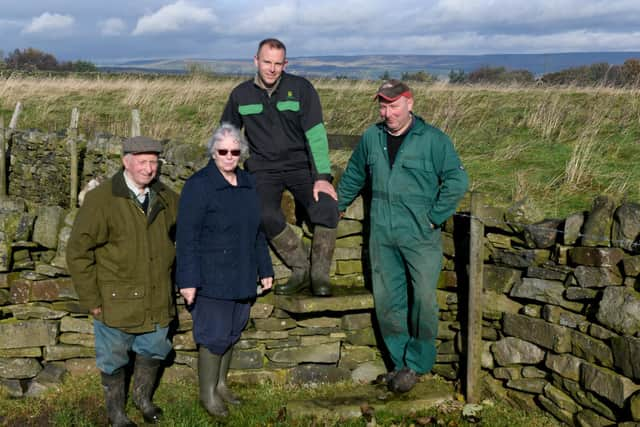Farm of the Week: Bradford brothers who have seen demand for their milk round rise since lockdown


Brothers John and David Leach never had any doubt that their future would be to follow in the early morning footsteps of their father Jack and grandfather in doorstep delivery of the pint, nor that they would do anything but follow their father into farming at Rapefield Farm in Allerton, near Bradford.
In recent times, the brothers have changed and tweaked several elements of their livestock farming operation on the 210-acre farm but only to make more effective use of their time and energy now that Jack is doing less.
Advertisement
Hide AdAdvertisement
Hide Ad

They have moved from running a sow herd to contract rearing of pigs; have given up with a suckler herd, moving on to rearing calves which are taken through to finishing; and having taken on Farm Assured status now trade all their beasts and lambs through Dunbia rather than the live auction market.
John said the milk round has always been an important part of their overall business and that the pandemic had made people realise the benefit of having milk delivered to their doorstep.
“Our grandad was a milkman in Bradford. He had a round on Sandy Lane. Dad bought his own round off a chap in Denholme and that’s still where we deliver today.
“What has happened over the last 20 months has woken up everybody back to appreciating milkmen and doorstep delivery. In the first fortnight of lockdown, in 2020, our deliveries went up 30 per cent and they have remained near to that ever since. We lost a little of it, understandably, when people went back to work.
Advertisement
Hide AdAdvertisement
Hide Ad

“David and I do the round together every day except Sunday. It takes five hours. We aim to get finished by 9.30 in the morning. Our milk comes from Dales Dairies in Grassington and it is all in glass milk bottles. Dad always said that glass was best and he’s been proven right on recycling.”
Jack and their mum Pat took on Rapefield, originally a 12-acre farm, in 1969. Jack started with a milk round and a sow herd, adding a suckler herd and sheep.
John said the sow herd that was Large White-cross-Welsh had reached 40 sows by the time he began working alongside his father, but that the way they now farm pigs and cattle is different to how they had been running the farm previously.
“With Dad’s help David and I have grown the business and this year we have gone on to contract rearing pigs on a bed and breakfast arrangement. Pigs now arrive at 11 weeks old when they are around 35 kilos and we look after them, feeding them ad-lib feed in their troughs, until they reach 110 kilos.”
Advertisement
Hide AdAdvertisement
Hide AdThe move has taken the brothers out of breeding pigs, and they have done the same with cattle.
David said one of the main reasons for changing their policy on pig production was in finding replacement gilts.
“Dad had started with pigs even before coming here in the sixties, but we were having trouble in more recent times finding clean, free from disease gilts. Not having to find new breeding stock now saves us so much time.
“The theory is that in just having to rear the pigs, rather than producing them, we can earn what we were making out of breeding stock, but more simply. We now purely care for the pigs that arrive.”
Advertisement
Hide AdAdvertisement
Hide AdDavid said their cattle numbers had also increased, as their pig numbers have, by coming out of running breeding stock.
“We came out of having a suckler herd about two years ago. We’d had Belgian Blue cows out of an Angus bull and the cow herd ran to around 30 at any one time. We had always reared a few on the bucket and made the decision that was our better way forward.
“We now have about 130 head at any one time. They arrive as calves from a local dairy herd, and we take everything through to finishing at around 20-22 months. We graze them and feed them silage inside during winter. Our hillside grassland is productive and the silage clamp we put in was one of the best things we have ever done. It gives us great quality feed. We don’t buy anything in other than corn.
“If you can grow some good quality, high protein grass it does the animals just as much good as throwing a lot of corn at them. It’s another cost saving thing and you can top them up when you need to with a bit of concentrate.”
Advertisement
Hide AdAdvertisement
Hide AdSheep make up the rest of the livestock at Rapefield and are now the only animals that John and David continue to breed. David said the flock of 200 breeding ewes has shifted from being 50/50 Mules and Texels to 30/70 towards Texels.
“The aim is to have the majority of the flock as Texel-cross-Mule, keeping enough Mules to take some of our own replacements. We are generally moving into crossbred sires including a Charollais-cross-Texel; Texel-cross-Beltex; and two Charollais-cross-Beltex; as well as a Texel. We lamb from the last week in March bringing them in a couple of days before their due date.”
Sending stock straight to Dunbia instead of going to the livestock market, particularly with fat lambs, was a decision John and David felt forced to make.
“Livestock market life has changed dramatically since foot and mouth in 2001. We also became Farm Assured, which meant we wanted to keep that status and not risk any chance of disease by cross contaminations, but the straw that broke the camel’s back for us was dad not being able to do the market run anymore.
Advertisement
Hide AdAdvertisement
Hide Ad“We were both still out on the milk round when the sale takes place on a Monday at Wharfedale Mart and we just couldn’t get there, but a trip to Dunbia fits in after the round and is a lot simpler.”
John said he feels that he and David working together, and the rest of the family helping out, offers them all a decent way of life and farming. “I’d rather work like David and I do, rather than as a one-man band. This way we can both have days off and holidays.”
